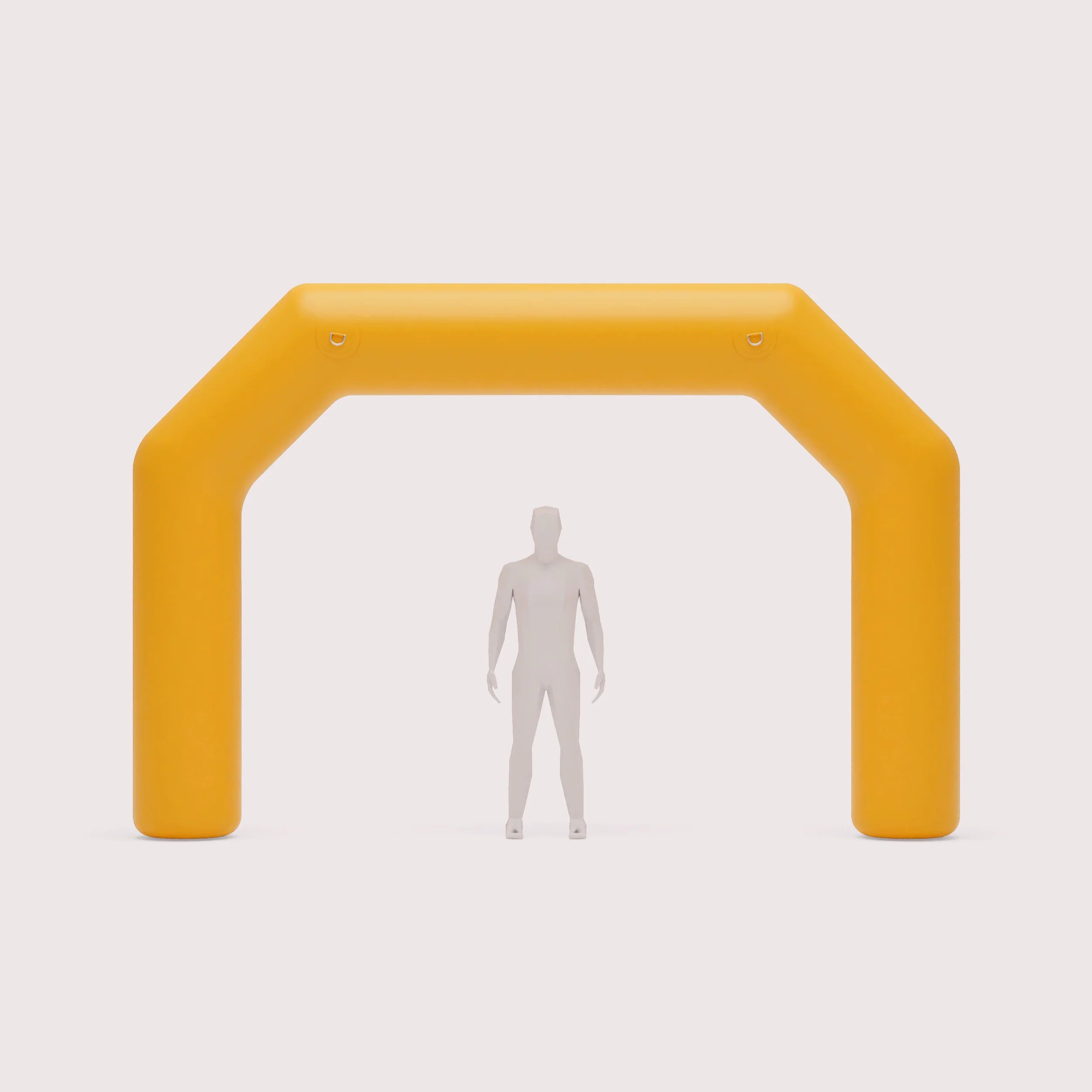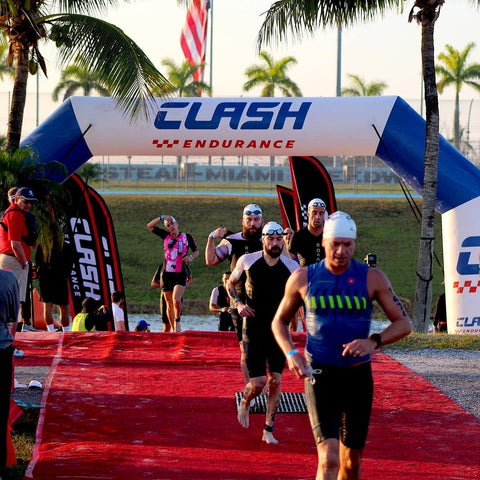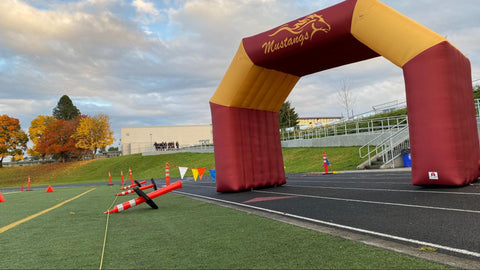But as times changed, so did we.
We shifted gears to something we believe is not just an alternative but a superior choice for many of our customers: denier polyester.
Why the switch, you ask? Let's dive into that.
You've probably encountered some of our competitors still singing praises of PVC, touting its durability as the be-all and end-all. And while we nod respectfully to the durability argument, we believe there's more to the story, especially for our clientele.
So, Who's Right About the Best Material?
Here's the scoop: Yes, PVC boasts impressive durability. But how relevant is that durability for products that see light — mostly event-based — use?
Our experience says not as much as you'd think.
For those of you using inflatables and tents sporadically for events, denier polyester is not just a good choice; it's the best choice. It's lighter, offers superior print quality, and, frankly, is just more practical for event use. PVC? It’s perfect if you plan to set up camp in the wilderness and never come back. But for everything else, there's denier polyester.

Create a bold entrance with our denier-fabricated inflatable arch, built tough and tailored with Pantone-matched colors for a perfectly branded event debut.
Shop Inflatable Arches
Settling the Debate, Once and For All
In this article, we'll demystify PVC and denier polyesters, laying them side by side for a thorough comparison.
We're here to settle this debate once and for all.
By breaking down the facts, comparing features, and analyzing applications, we aim to provide you with everything you need to make an informed decision that's perfectly aligned with your use case.
What is PVC?
At its core, PVC is a simple plastic made from the earth's natural resources: salt and oil. Its ability to withstand the elements without breaking a sweat makes it the material of choice for outdoor furniture, window frames that battle the seasons, and life-saving medical devices that demand cleanliness and durability.Its toughness and resilience also make it popular for display products like inflatables and canopies, where it stands up to repeated use and provides a reliable structure.

MVP Visuals transitioned from using PVC to denier polyester for our inflatable arches, embracing innovation and quality.
Pros
- Durability: Highly resistant to weather, chemicals, and wear, making it last long under harsh conditions.
- Water Resistance: Naturally waterproof, perfect for outdoor and medical applications.
- Fire Resistance: Contains chlorine, which gives it inherent fire-retardant properties.
- Cost-Effective: Generally more affordable for certain applications compared to alternatives like metals or higher-end plastics.
Cons
- Weight: Heavier than alternatives like denier polyester, affecting transportation and setup for events.
- Stiffness: Rigid PVC can be brittle at low temperatures, reducing its impact resistance.
- Environmental Concerns: Production and disposal raise ecological issues, including toxic byproducts and difficulties in recycling mixed types of PVC.
- Health Risks: Certain types of PVC can release harmful chemicals, particularly when burned or during the manufacturing process.
- Thermal Sensitivity: Can degrade at high temperatures, releasing harmful hydrochloric acid gas.
- Regulatory Restrictions: The use of PVC is restricted in some applications due to health and environmental regulations.
What is Denier Polyester?
Denier polyester is made from a type of synthetic plastic, making it both durable and versatile. Imagine you have a long, thin thread. How thick this thread is can be measured, and that's where "Denier" comes in. When we talk about denier polyester, we're talking about how thick the polyester threads are in fabric, like the kind used for inflatables and tents at events. A bigger number means a thicker thread. So, if you see something made from 300D polyester, it means the threads are a certain thickness, and 600D would be thicker and stronger.
An inflatable arch made of denier polyester stands at the ready for an event at Milwaukie High School
Pros
- Lightweight: Easier to handle, transport, and set up, especially for temporary structures like tents and inflatables.
- Excellent Print Quality: Offers vibrant color and print definition, making it ideal for branded materials and detailed graphics.
- Durability: Strong enough for repeated use in event settings, resistant to tearing and stretching.
- Water Resistance: Polyester fabrics can be coated or treated to repel water, making them suitable for outdoor use.
- Cost-Effective: Offers a good balance between performance and price, providing value for budget-conscious consumers.
- Easy Maintenance: Simple to clean and quick-drying, requiring less care than natural fiber materials.

Our denier canopy tents offer reliable shelter and high-quality branding for outdoor events like the Rangerstown 5K.
Cons
- Less Rugged than PVC: While durable, it may not be as hardy as PVC for certain heavy-duty applications.
- UV Sensitivity: Can be susceptible to fading and degradation with prolonged exposure to sunlight unless specifically treated for UV resistance.
- Environmental Impact: As a synthetic material, it's derived from petroleum, raising concerns about fossil fuel use and recyclability.
- Thermal Sensitivity: Can melt or warp at high temperatures, requiring caution in environments with extreme heat.
- Chemical Sensitivity: May degrade when exposed to certain chemicals, oils, or acids, limiting its use in some industrial applications.
PVC vs Denier Polyester: Why Denier Wins for Events
When choosing between denier polyester (denier polyester) and PVC for inflatables and canopies, it's essential to consider what matters most for your event or project. Here's how these materials stack up against each other based on key factors:| Criteria | Denier polyester | PVC |
|---|---|---|
| Print Quality | Superior: vibrant, detailed graphics ideal for branding. | Lower: suitable for simpler designs, less color precision. |
| Portability (Weight) | Lighter: easier to transport, set up, and take down. | Heavier: less ideal for quick changes or ease of movement. |
| Durability | Commendable: suits most event uses, especially with higher deniers like 600D. | Superior: withstands harsh conditions, offering higher protection. |
| Cost | More cost-effective: lower lifecycle and maintenance costs. | Higher upfront cost: offers long-term savings due to durability. |
Print Quality
Denier polyester shines when it comes to print quality. Its surface allows for vibrant and detailed graphics, making it the preferred choice for brands that want their logos and designs to pop. Whether it’s for promotional banners or custom tents, denier polyester ensures your message is seen in the best light.
PVC, while durable and versatile, doesn't quite match up to denier polyester in terms of print clarity and color vibrancy. It's suitable for simpler designs and where color precision is less critical.
Portability (Weight)
Denier polyester is notably lighter than PVC, which makes it much easier to transport, set up, and take down. This is a crucial advantage for event organizers who need to frequently move and reassemble their displays.
PVC is heavier, making it less ideal for situations requiring quick changes or where ease of movement is paramount. Its weight contributes to its durability but can be a drawback for portability.
Durability
PVC stands out for its ruggedness and ability to withstand harsh conditions, from heavy rain to strong winds. It's the go-to for structures that require a higher level of protection against the elements.
Denier polyester offers commendable durability, especially in higher deniers like 600D. While it may not be as indestructible as PVC, it provides ample resilience for most event uses and is particularly suited to environments where extreme conditions are not a constant concern.
Cost
Denier polyester is generally more cost-effective, especially when factoring in the lifecycle and maintenance costs. Its lower weight reduces shipping and handling expenses, making it a budget-friendly option for a wide range of applications.
PVC might have a higher upfront cost, attributed to its material properties and the production process. However, its longevity and resistance to wear and tear can offer long-term savings for permanent installations.
Denier Polyester: A Practical Decision for Event Success
 Denier-made inflatable arch, celebrating durability and ease of setup, frame the start of Fort Drum's community race.
Denier-made inflatable arch, celebrating durability and ease of setup, frame the start of Fort Drum's community race.Denier polyester offers exceptional print quality, making your designs stand out. Its lightweight nature simplifies transport and setup, a boon for event organizers. While PVC has its edge, especially in durability, denier polyester's blend of quality, ease of use, and cost-efficiency aligns perfectly with the dynamic demands of event use.
Denier polyester is, without doubt, the better choice for creating impactful and efficient event spaces.



